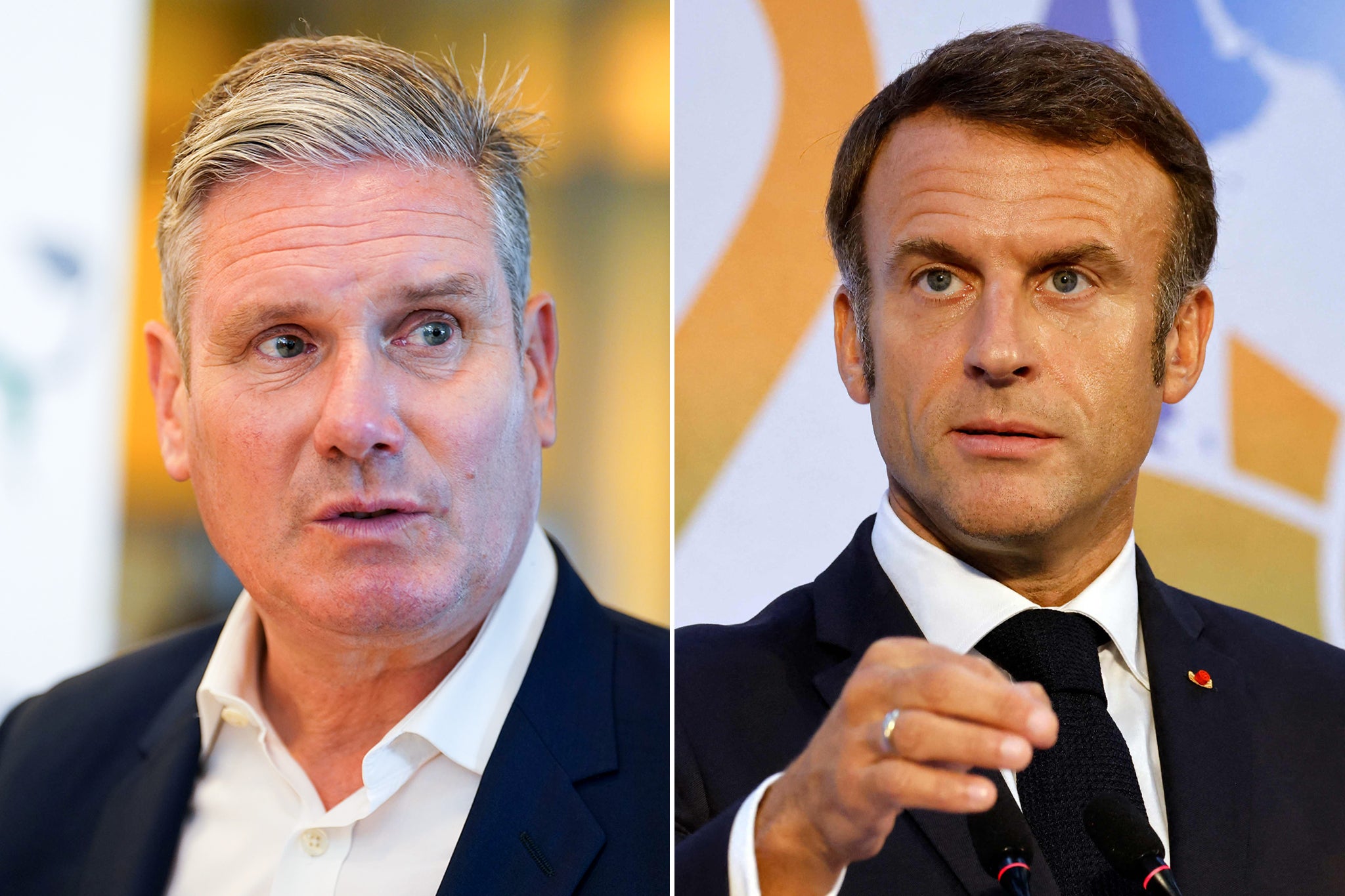Ooh la la! Starmer’s invitation to meet Macron is a coup très formidable
Foreign governments read our opinion polls too – which is why the sudden outburst of French cordiality is a clear sign they think they know who’ll be the next PM, writes John Rentoul


The Labour leader’s team were so excited about Keir Starmer meeting Emmanuel Macron next week that news of the likely engagement leaked before it was confirmed.
They know how important it is that the French president is willing to meet the British leader of the opposition. In the delicate language of diplomacy, in which leaders are reluctant to interfere in the internal politics of another democracy, it says only one thing: that Macron expects Starmer to be prime minister.
Everything else is secondary. A trip to the Elysee Palace (ahead of the King himself) will allow Starmer to strut the world stage. One of his strengths is that he looks the part of prime minister – square suit, square jaw, square hair – but he doesn’t have much foreign policy experience.
Hence the importance of three trips in the next few days. On Wednesday evening, the Labour leader traveled to the Hague in the Netherlands for a meeting on Thursday with Interpol, the global police cooperation organisation. On Friday he flies to Montreal for a gathering of centre-left leaders from around the world. Then on Monday, as the French president’s office has now confirmed, Starmer will travel to Paris for talks with President Macron.
But Macron’s handshake is more significant than a chance for Starmer to pose as a world leader. It is a vote of confidence in Labour’s prospects at the general election. Foreign governments can read opinion polls too, and make their plans accordingly.
Macron’s invitation can be added to all the signs that the tectonic plates of British politics are moving. Money is pouring into Labour’s coffers. Businesses queued up to take stands at the party’s annual conference in Liverpool next month.
Conservative donors are proving harder to shake down to stump up to pay for Sunak’s attempt to overcome Labour’s 18-point opinion-poll lead. By-elections are a write-off for the government (although the Tories did hold Boris Johnson’s former seat of Uxbridge). There are low murmurings in Westminster that another Tory MP might join Christian Wakeford, who defected to Labour last year.
None of this should matter, but it does. The more Labour looks like a government in waiting, the more credible it seems, and the more the party’s standing in the polls is reinforced. The reverse is true for the Conservatives: the more people assume that they will be dealing with Prime Minister Starmer by the end of next year, the harder it is for the outgoing government to get things done, and the easier it is for Starmer to brand Sunak “inaction man” – as he did at Prime Minister’s Questions.
So far, so superficial. But Starmer’s trip to Paris is important for another reason, which is that relations with the French government matter to whoever is prime minister of the UK. Sunak recognised this, and tried to put his relationship with Macron on a sounder footing than Boris Johnson and Liz Truss ever managed.
When Sunak went to the Elysee in January this year, he secured a constructive deal with Macron on intercepting small boats. It was a deal that could not have been done with Johnson or Truss, who couldn’t help themselves when presented with the chance of anti-French posturing.
But it wasn’t the dramatic deal for which Sunak had hoped. We never found out what Sunak thought he might be able to persuade Macron to accept, but he seems to have been thinking of some kind of returns agreement that would allow the UK to pick up small boats and take them back to France for asylum processing.
In the end, Macron made clear that any such deal would have to be agreed between the UK and the EU. Which is why his conversation with Starmer could be significant, because a Labour government would be more able to reach such an agreement. Sunak has the advantage of good personal relations with Ursula von der Leyen, the EU Commission president. But his party will not allow him to negotiate asylum policy with the EU.
That is what could make a difference under a Labour government. Until now, the opposition’s policy on small boats has been unconvincing. It consists of a “five-point plan”, which is an attempt by Yvette Cooper, the shadow home secretary, to repackage what the government is already doing in a different language – but without the policy of trying to remove asylum seekers to Rwanda.
If Starmer and Macron have a constructive discussion, it might allow the Labour government-in-waiting the chance to present a credible plan on immigration – currently one of its weakest areas.
No wonder Starmer’s team were pleased.







Join our commenting forum
Join thought-provoking conversations, follow other Independent readers and see their replies
Comments